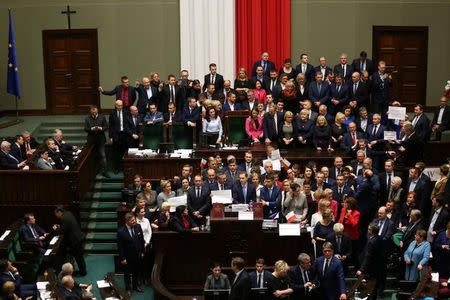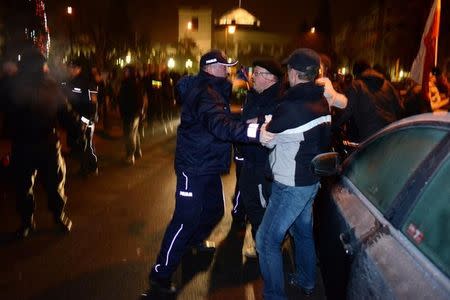Polish opposition keeps blocking parliament in standoff with government
By Pawel Florkiewicz and Lidia Kelly WARSAW (Reuters) - Polish opposition leaders said on Saturday they would maintain their blockade of parliament's main hall and called for popular protests against a government that has accused it of trying to seize power. Poland's biggest political standoff in years began on Friday when opposition lawmakers objected to plans by the ruling Law and Justice (PiS) party to curb media access to parliament, and blocked the plenary hall podium ahead of a budget vote. About two dozen members of the Civic Platform (PO) party have taken turns to occupy the podium and the party's leader said they would remain there for the next few days. PiS lawmakers moved voting to another area without media access, prompting accusations they had passed the 2017 budget illegally, breaching the constitution. Prime Minister Beata Szydlo said the protest was just whining by parties that lost an election in 2015 after eight years in government. But striking a more conciliatory tone, PiS leader Jaroslaw Kaczynski moved to organise a meeting between the speaker of the upper house of parliament and the media late on Saturday night to discuss the new plan for journalists' access. Several thousand people protested in Warsaw and other cities after police broke up a blockade of the entrances to parliament in the early hours of Saturday. Poland's Western allies have expressed concerns over government plans to reform the constitutional court, saying it contravened democratic standards. But despite criticism at home and abroad, the eurosceptic PiS enjoys steady support among many Poles eager to hear its message of higher welfare, more Catholic values in public life and less dependence on foreign capital. "The situation ... has nothing in common with the real condition of our country," Prime Minister Szydlo said in a televised address. "On the contrary, it reflects a sense of helplessness and frustration on the part of those who lost power and don't have nay ideas how to attract Poles to their views." Earlier on Saturday, European Union Council President Donald Tusk, a former head of the PO - Poland's largest opposition party - urged the government to "respect and regard the people, constitutional principles and morals." "Those who undermine the European model of democracy (and) attack the constitution and good customs, expose all of us to strategic risks. By throwing away the spirit of freedom and community, they write the next act of Poland's solitude," Tusk, who has a long-standing feud with PiS head Jaroslaw Kaczynski, told a conference in Wroclaw. At Saturday's protests in a freezing Warsaw, opposition leaders served hot tea to the police and some of the 5,000 demonstrators who held banners saying "Free media" and carried Polish and European Union flags. "If it becomes clear that it is impossible to talk to (PiS lawmakers), we should have early elections," Ryszard Petru, head of the liberal Nowoczesna grouping, told the protesters. A snap election is unlikely, however, as PiS has a majority in parliament and could block any vote of no confidence. One EU diplomat said the protests highlighted divisions in Poland but did not represent a growing anti-government movement. "The people who have gone out to the streets are essentially those who are anti-government from the beginning," said the diplomat. "I am not getting a feeling that people are ready to go up and protest. It doesn't mean they won't one day," (Additional reporting by Karol Wittenberg, Wojciech Zurawski, Pawel Sobczak and Justyna Pawlak; Writing by Justyna Pawlak and Lidia Kelly; Editing by Robin Pomeroy)



